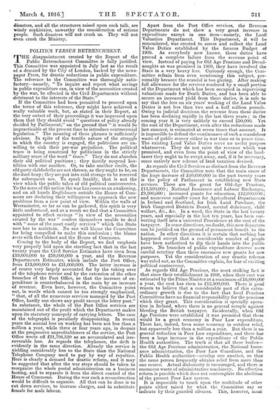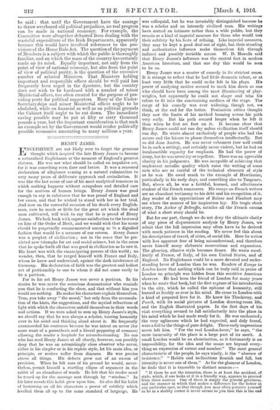POLITICS VERSUS RETRENCHMENT. T HE disappointment created by the Report of
the Public Retrenchment Committee is fully justified. This Committee was appointed in July last as the result of a demand by the City of London, backed by the news- paper Press, for drastic reductions in public expenditure. The reference to the Committee was thoroughly satis- factory—namely, " To inquire and report what savings in public expenditure can, in view of the necessities created by the war, be effected in the Civil Departments without detriment to the interests of the State."
If the Committee had been permitted to proceed upon the terms of this reference, they might have achieved a really valuable work, but, as stated in their Report, at the very outset of their proceedings it was impressed upon them that they should avoid " questions of policy already decided by Parliament," on the ground" that " it would be impracticable at the present time to introduce controversial legislation." The meaning of these phrases is sufficiently obvious. In spite of the terrific nature of the struggle in which the country is engaged, the politicians are un- willing to sink their pre-war prejudices. The political truce is being construed by politicians in • the strictly military sense of the word " truce." They do not abandon their old political positions ; they Merely suspend hos- tilities with one another. Or, to take another simile, the old party shibboleths are not thrown, as they ought to be, on the dust-heap ; they are put into cold storage to be reserved for subsequent use. To speak frankly, that is not the view which the public takes of old political controversies. To the mass of the nation the war has come as an awakening, and on all hands Englishmen outside the House of Com- mons are declaring their willingness to approach the new problems from a new point of view. Within the walls of Westminster, so far as can be gathered, this spirit is very little understood, and as a result we find that a Committee appointed to effect savings " in view of the necessities created by the war " confess themselves unable to deal with " some of the most costly services " which the State now has to maintain. No one will blame the Committee for being compelled to make this confession ; the blame rests with the Cabinet and the House of Commons.
Coming to the body of the Report, we find emphasis very properly laid upon the startling fact that in the last twenty years the Civil Service Estimates have risen from £19,000,000 to £59,000,000 a year, and the Revenue Departments Estimates, which include the Post Office, from £13,000,000 to £31,000,000. The latter increase is of course very largely accounted for by the taking over of the telephone service and by the extension of the other branches of the Post Office, so that the increase of ex- penditure is counterbalanced in the main by an increase of revenue. Even here, however, the Committee point out, in words which cannot be too strongly emphasized, " that, of all the numerous services managed by the Post Office, hardly one shows any profit except the letter post." In substance, the whole of the Post Office services are maintained out of the profit which the Department makes upon its statutory monopoly of carrying letters. The case of the telegraphs is peculiarly disappointing. In recent years the annual loss on working has been not less than a million a year, while three or four years ago, in despair at the progressive unprofitableness of the service, the Post Office wrote off £21,796,520 as an accumulated and irre- coverable loss. As regards the telephones, the drift is evidently in the same direction. Already the service is yielding considerably less to the State than the National Telephone Company used to pay by way of royalties. Here is clearly a demand for drastic reform, and it may be suggested that after the war steps should be taken to reorganize the whole postal administration on a business footing, and to separate it from the direct control of the House of Commons. During the war such a reconstruction would be difficult to organize. All that can be done is to cut down services, to increase charges, and to substitute female for male labour. Apart from the Post Office services, the Revenue Departments do not show a very great increase in expenditure except in one item—namely, the Land Valuation Department. This Department, it will be remembered, was created to assess and collect the Land Value Duties established by the famous Budget 6f 1909. As everybody now knows, those duties have proved a complete failure from the revenue point of view. Instead of paying for Old Age Pensions and Dread- noughts as was promised in 1909, they have involved the State in a very heavy loss. Curiously enough, the Com- mittee refrain from even mentioning this subject, pre- sumably because the scandal is too glaring. After making full allowance for the services rendered by a small portion of the Department which has been occupied in siipervising valuations made for Death Duties, and has been able to secure an increased yield from these duties, it is safe to say that the loss on six years' working of the Land Value Duties is not less than two and a half million pounds. Owingto judicial decisions, the revenue from these duties has been declining rapidly in the last three years ; in the coming year it is very unlikely to exceed £50,000. Yet the cost of the Department, even after the reductions made last summer, is estimated at seven times that amount. It is impossible to defend the continuance of such a scandalous waste of public money either in war time or in peace time. The existing Land Value Duties servo no useful purpose whatsoever. They do not raise the revenue which was promised, and even from the point of view of the land- taxer they ought to be swept away, and, if it be necessary, some entirely new scheme of lend taxation devised.
As regards the Civil Services as distinct from the Revenue Departments, the Committee note that the main cause of the huge increase of £40,000,000 in the past twenty years is the policy of Parliament in establishing new State services. These are the grant for Old-Age Pensions, £13,500,000 ; National Insurance and Labour Exchanges, 19,500,000 ; increased grants for education, 112,000,000 and numerous smaller sums for Agricultural Departments in Ireland and Scotland, for Irish Land Purchase, the Irish Congested Districts Board, mental deficiency, child. welfare, &c., &c. In a word, the State in the last twenty years, and especially in the last ten years, has been con- verting itself into a universal Providence at the cost of the taxpayer. In some directions, no doubt, this new departure can be justified on the ground of permanent benefit to the nation. In other directions it is certain that nothing has happened except that a considerable number of people have been authorized to dip their hands into the public purse. No branches of public expenditure deserve more careful scrutiny than these enormous new grants for new purposes. Yet the consideration of any drastic reforms was ruled out, as the Committee explain, for fear of exciting political controversy.
As regards Old Age Pensions, the most striking fact is that since their establishment in 1908, when their cost was estimated by the Prime Minister at a maximum of £6,000,000 a year, the cost has risen to £13,500,000. There is good reason to believe that a considerable part of this extra- ordinary growth is due to the fact that local Pensions Committees have no financial responsibility for the pensions which they grant. This consideration is specially opera- tive in Ireland, where there is no general scruple against bleeding the British taxpayer. Incidentally, when Old Age Pensions were established it was promised that there would be a great economy in Poor Law expenditure. There has, indeed, been some economy in outdoor relief, but apparently less than a million a year. But there is no general reduction in Poor Law expenditure, and there has been a large increase in the expenditure of the Public Health authorities. The truth is that all these bodies— the Old Age Pensions administration, the National Insur- ance administration, the Poor Law Guardians, and the Public Health authorities—overlap one another, so that the same person frequently obtains relief from more than one source. Actual dishonesty is encouraged, and there-is enormous waste of administrative machinery. No effective reform is possible which does not contemplate the abolition of the present Poor Law system. It is impossible' to touch upon the multitude of other points either raised by what the Committee say or indicate by their guarded silences. This, however, must be said : that until the Government have the courage to throw overboard old political prejudices, no real progress can be made in national economy. For example, the Committee were altogether debarred from dealing with the wasteful expenditure of the Irish Departments, apparently because this would have involved references to the pro- visions of the Home Rule Act. The question of the payment of Members is a subject with which the public is thoroughly familiar, and on which the mass of the country has certainly made up its mind. Equally important, not only from the point of view of national economy, but also from the point of view of political purity, is the question of the excessive number of salaried Ministers. That Ministers holding important and responsible offices should be well paid has frequently been urged in the Spectator, but the country does not wish to be burdened with a number of minor Ministerial offices, too often created for the purpose of pro- viding posts for political supporters. Many of the Under- Secretaryships and minor Ministerial offices ought to be abolished, while on financial as well as on political grounds the Cabinet itself ought to be cut down. The immediate saving possible may be put at fifty or sixty thousand pounds a year, but the important consideration is that such an example set by the Government would render politically possible economies amounting to many millions a year.



































 Previous page
Previous page